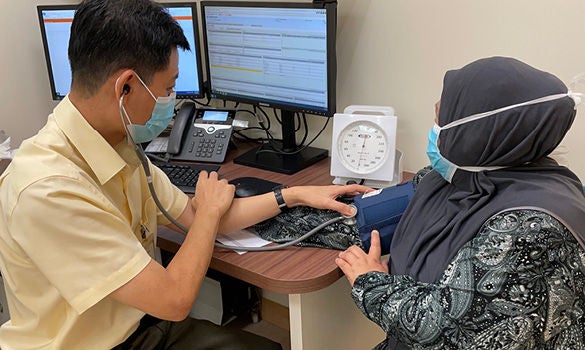
PHOTO: SINGHEALTH POLYCLINICS
SINGAPORE - Patients with ailments such as high blood pressure and diabetes will soon be able to skip the fasting process before taking a cholesterol test at SingHealth polyclinics.
This comes after a local study found that there was little difference in test results whether the patients, including those with high cholesterol, had fasted or not.
The change in requirement will help to reduce crowds at testing laboratories and polyclinics in the morning as patients can be scheduled for tests throughout the day.
Blood tests that require fasting are typically done in the morning as most patients fast when they are asleep.
"Removing the need for fasting will mitigate the discomfort and potential adverse effects of fasting, such as low blood sugar and dehydration, on our patients," said Dr Ian Phoon, the main author of the study and clinical lead of the cardiovascular health workgroup at SingHealth Polyclinics.
Published in British science journal Scientific Reports in March this year, the study ran two cholesterol tests on 470 patients aged 21 and above with high cholesterol and diabetes. One test was done after fasting and the other without fasting.
Fasting for a cholesterol blood test usually means not eating or drinking anything but plain water for at least eight hours before the test.
Using a Paired Sample T-Test, the study found that the mean difference between the two test sets was insignificant.
This means that not fasting did not significantly change the levels of substances typically measured during a cholesterol test, including triglycerides, total cholesterol, low-density lipoprotein cholesterol (LDL-C) and high-density lipoprotein cholesterol (HDL-C).
HDL-C absorbs cholesterol and carries it back to the liver for excretion. LDL-C is bad cholesterol, too much of which can lead to a build-up of plaque in the arteries and cause heart disease or stroke.
There were, however, six patients, or 1.28 per cent of test subjects, whose results could not be generated properly because they did not fast.
The level of their bad cholesterol could not be calculated because the level of triglycerides in their blood was too high.
For such patients, they can do a fasting test on a separate day, or an alternative test that measures their bad cholesterol directly, albeit at a higher price.
"Even if this happens, it is not common. Most patients will be fine with doing a non-fasting cholesterol test," said Dr Phoon.
While fasting is not necessary, he cautioned against drinking alcohol or consuming a fatty meal before a cholesterol check. "Be sensible and eat something that is not too oily."
Dr Tan Ngiap Chuan, director of research at SingHealth Polyclinics, said they are currently evaluating the workflow for the new guideline, which should be in place by the end of this year.
In 2019, the Ministry of Health allowed those without medical conditions to skip the fasting process for cholesterol tests, but a check with doctors in several clinics and hospitals found that fasting is still the norm here.
Some doctors said fasting helps to reduce the uncertainty over the validity of test results while others said it is a requirement set by testing laboratories.
Singapore is not the first country to do away with fasting for cholesterol tests. Denmark adopted the approach as early as 2009.
People screening for diabetes are allowed to use a non-fasting test known as HbA1c which measures the amount of blood sugar attached to red blood cells.
However, medical conditions such as anaemia, where there is a lack of red blood cells, could affect the accuracy of the test.
SOURCE: The Straits Times, Singapore Press Holdings Limited. Reproduced with permission.
Contributed by














 Get it on Google Play
Get it on Google Play